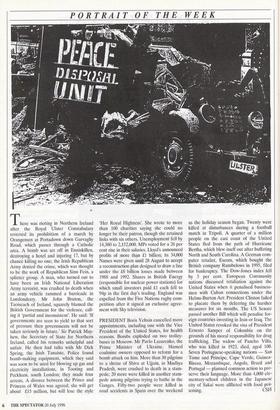PORTRAIT OF THE WEEK
There was rioting in Northern Ireland after the Royal Ulster Constabulary reversed its prohibition of a march by Orangemen at Portadown down Garvaghy Road, which passes through a Catholic area. A bomb was set off in Enniskillen, destroying a hotel and injuring 17, but by chance killing no one; the Irish Republican Army denied the crime, which was thought to be the work of Republican Sinn Fein, a splinter group. A man, who turned out to have been an Irish National Liberation Army terrorist, was crushed to death when an army vehicle rammed a barricade in Londonderry. Mr John Bruton, the Taoiseach of Ireland, squarely blamed the British Government for the violence, call- ing it 'partial and inconsistent'. He said: 'If governments are seen to yield to that sort of pressure then governments will not be taken seriously in future.' Sir Patrick May- hew, the Secretary of State for Northern Ireland, called his remarks unhelpful and unfair. He then had talks with Mr Dick Spring, the Irish Tanaiste. Police found bomb-making equipment, which they said was soon to be used for blowing up gas and electricity installations, in Tooting and Peckham, south London; they made four arrests. A divorce between the Prince and Princess of Wales was agreed; she will get about £15 million, but will lose the style
`Her Royal Highness'. She wrote to more than 100 charities saying she could no longer be their patron, though she retained links with six others. Unemployment fell by 14,300 to 2,152,000. MPs voted for a 26 per cent rise in their salaries. Lloyd's announced profits of more than £1 billion; its 34,000 Names were given until 28 August to accept a reconstruction plan designed to draw a line under the £8 billion losses made between 1988 and 1992. Shares in British Energy (responsible for nuclear power stations) for which small investors paid £1 each fell to 94p in the first day's trading. England was expelled from the Five Nations rugby com- petition after it signed an exclusive agree- ment with Sky television.
PRESIDENT Boris Yeltsin cancelled more appointments, including one with the Vice President of the United States, for health reasons. Bombs exploded on two trolley- buses in Moscow. Mr Pavlo Lazarenko, the Prime Minister of Ukraine, blamed coalmine owners opposed to reform for a bomb attack on him. More than 30 pilgrims to a shrine of Shiva at Ujjain, in Madhya Pradesh, were crushed to death in a stam- pede; 20 more were killed in another stam- pede among pilgrims trying to bathe in the Ganges. Fifty-two people were killed in road accidents in Spain over the weekend as the holiday season began. Twenty were killed at disturbances during a football match in Tripoli. A quarter of a million people on the east coast of the United States fled from the path of Hurricane Bertha, which blew itself out after buffeting North and South Carolina. A German com- puter retailer, Escom, which bought the British company Rumbelows in 1995, filed for bankruptcy. The Dow-Jones index fell by 3 per cent. European Community nations discussed retaliation against the United States when it penalised business- men with Cuban connections under the Helms-Burton Act: President Clinton failed to placate them by deferring the harsher measures for six months. The US Senate passed another Bill which will penalise for- eign countries investing in Iran or Iraq. The United States revoked the visa of President Ernesto Samper of Colombia on the grounds of his moral responsibility for drug trafficking. The widow of Pancho Villa, who was killed in 1923, died, aged 100. Seven Portuguese-speaking nations — San Tome and Principe, Cape Verde, Guinea- Bissau, Mozambique, Angola, Brazil and Portugal — planned common action to pre- serve their language. More than 4,000 ele- mentary-school children in the Japanese city of Sakai were afflicted with food poi-


























































 Previous page
Previous page